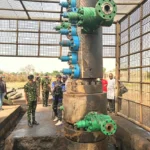By Abigael Joshua and Tosin Kolade
The Federal Government on Thursday called for collective action and partnerships to address the escalating challenge of open defecation, as 48 million Nigerians still practice it.
This was the thrust at a joint news conference between the Ministries of Water Resources and Sanitation and the Environment in commemoration of the 2023 World Toilet Day in Abuja.
The theme of the day is ‘Accelerating Change’.
Prof. Joseph Utsev, Minister of Water Resources and Sanitation, underscored the urgency of collaborative efforts on the occasion of the day.
According to him, the call to action aims to curb this pressing issue and pave the way for a healthier, more sustainable future.
Utsev, quoting the 2023 update report of the WHO/UNICEF Joint Monitoring Programme, said an estimated 3.5 billion people still lack access to safe toilets of which 419 million practice open defecation.
He said 40 per cent of wastewater is discharged into the environment without treatment.
The minister said some of the untreated wastewater was being used in irrigation farming and the produce consumed with the attendant risks.
“In Nigeria, over 100 million persons lack access to basic sanitation while an estimated 48 million practice open defecation.
“This puts the country among the countries with the highest number of people involved in this practice,”he said.
 He said collaborative efforts have led to a notable reduction in the number of people practicing open defecation, citing interventions like Executive order 009 and declaring a state of emergency in the sector.
He said collaborative efforts have led to a notable reduction in the number of people practicing open defecation, citing interventions like Executive order 009 and declaring a state of emergency in the sector.
This positive stride, he said, reflected the success of collective action and partnerships, bringing hope for a cleaner, healthier future for the nation.
He said meeting the country’s commitments for SDG 6 for sanitation required a sanitation value chain starting from containment to transport, treatment and disposal or reuse are improved and strengthened for sustainability.
“On containment, there is a need to ensure that there is availability of toilet facilities for everyone at home and in public places.
“It is also important that the transportation, treatment and disposal or reuse component of the service chain is strengthened to ensure a safely managed sanitation service which is the objective of the SDG sanitation target.
“This will require providing an enabling environment for private sector participation along the sanitation service chain.
“In line with the SDG definition of safely managed sanitation, households are not expected to share toilet facilities while human waste is either treated or disposed of on or off-site”.
The minister said his ministry had created an enabling environment through policy, regulations and frameworks to ensure that individual sanitation behaviour aligned with broader efforts to scale up sanitation everywhere.
He said everyone has a role to play, from breaking the taboo on toilets to fixing leaking water and waste pipes, emptying full septic tanks, reporting indiscriminate dumping of sludge, etc.
“We all can do our part in accelerating progress to safe toilets and sustainable sanitation for all”.
Earlier, the Minister of Environment, Malam Balarabe Lawal, said the sanitation crisis posed a threat to the natural environment and the health of citizens, particularly women, girls and other vulnerable groups.
According to him, the major consequences of poor excreta and sewage disposal are the high rate of diarrhoea disease, the second cause of high mortality rates among under-five children.

He said that persistent re-occurrence of annual incidences of cholera outbreaks in some states were manifestations of inadequate toilet facilities, saying with safe excreta disposal, it could be prevented.
“The Federal Ministry of Environment in collaboration with critical stakeholders have reviewed and validated the 2005 National Environmental Sanitation Policy including its policy guidelines on safe excreta and sewage disposal.
“The ministry is also continuing with its community-based intervention on the control of open defecation programmes as well as the Clean and Green Programme.
“It is aimed among others at promoting the provision of safe and adequate toilets across the country, particularly in public places and ensuring proper excreta management.
“Modern public toilets have been provided in communities and markets across the federation under these programmes”.
The News Agency of Nigeria (NAN) reports that the UN General Assembly designated Nov. 19 as World Toilet Day, to celebrate toilets and raise awareness of billions of people living without access to safely managed sanitation. (NAN) www.nannews.ng)
Edited by Joseph Edeh












